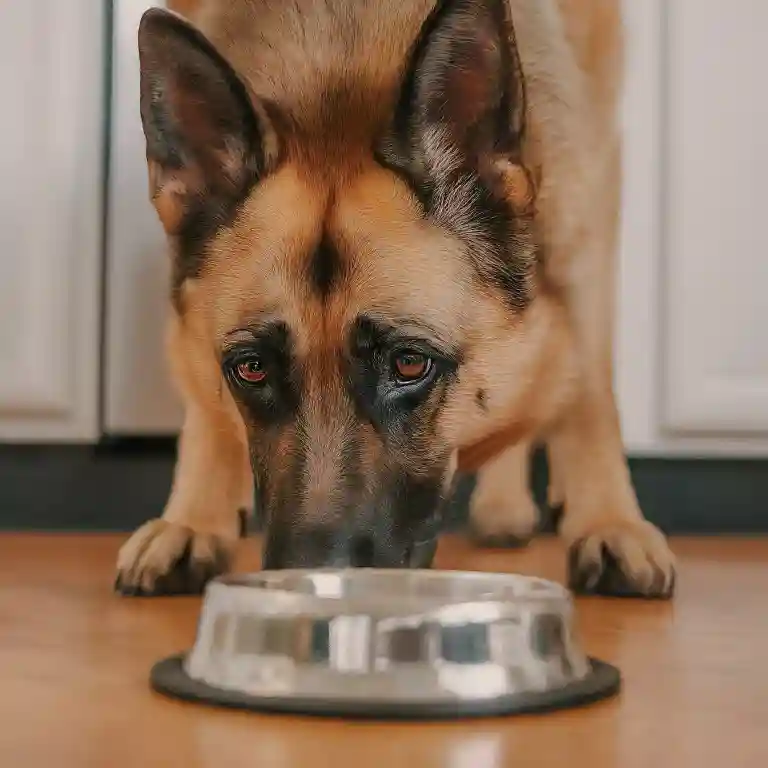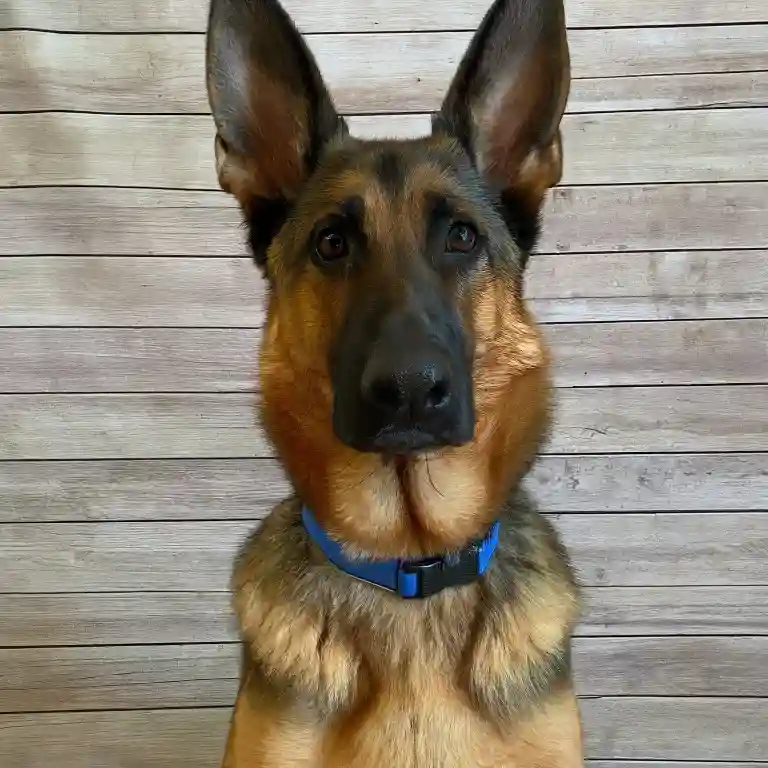The German Shepherd is an intelligent dog breed. They’re loyal & protect their owners. The Government of Germany uses German Shepherds as police & military working dogs.
Let’s Find Your Answer:
- Why Is My German Shepherd So Skinny?
10 Big Reasons: Why Is My German Shepherd So Skinny?
If your German Shepherd is too thin, it could be a sign of something wrong with their health.
- Not giving enough food: If they can’t have a proper diet, they can look thin. The American Kennel Club finds that adult German Shepherds need 1,500 to 1,700 calories a day, which depends on their age, size & how active they are.
- Malnutrition: Malnutrition can happen to a dog if they eat low-quality food or don’t get the right nutrients. Some dog foods in the US may not be good enough for some breeds like the German Shepherd.
- Parasites: Worms in dogs can make them look thin and lose weight. Some common parasites in dogs are roundworms, hookworms, and tapeworms, which can make them sick and lose weight.
- Medical Conditions: Some health problems, like thyroid issues or digestive problems, can make it hard for a German Shepherd to stay at a good weight.
- Stress or Anxiety: When German Shepherds are stressed, they may not want to eat as much & could lose weight. In the US, it can be common where dogs not to move regularly, or be separated from their owners which can impact a dog’s eating habits.
- Excessive Exercise: Exercise is important to stay healthy, but too much exercise can cause weight loss to your German Shepherd. In the US, people participate in dog sports, which can impact dog health.
- Genetic Factors: Some German Shepherds can have some health problems that can affect their weight. In the US, genetic factors can affect German Shepherd’s health.
- Dental Problems: Problems with teeth and gums can make it hard for German Shepherds to eat, which can cause weight loss. So, take care of their teeth to keep them healthy.
- Infections: Infections or health issues like diabetes can be the reasons for your German Shepherd to lose weight.
- Old Age: As German Shepherds get older, they need less food & exercise. Older German Shepherds can lose weight because they have less energy & muscle mass.
Signs Of A Skinny German Shepherd

A healthy German Shepherd should be strong and fit, not too skinny. You can look for these signs for a skinny German Shepherd.
- Visible Ribs: You should feel your dog’s ribs, but they shouldn’t stick out. If you can see their ribs without touching them, that’s a warning sign.
- Sharp Spine and Hip Bones: You should be able to feel your dog’s bones, but they should not stick out too much. If you can feel them very easily, your dog might be too skinny.
- Prominent Bony Protrusions: You shouldn’t be able to see the bones near the tail and shoulders too much.
- Hourglass Body Shape: A healthy German Shepherd should have a triangle-shaped body when seen from above, wider at the chest & narrowing towards the back. If their body looks more narrow in the middle, like an hourglass, they might be too thin.
- Reduced Energy: If your German Shepherd is feeling tired or doesn’t want to play, they may not be getting the right nutrients they need.
- Dull Coat: A healthy fur should be glossy and full. Not eating right can cause the fur to look dry and lifeless.
How To Keep German Shepherds Healthy?
German Shepherds are smart and active dogs, but they need special care to stay healthy.
Diet
- Protein-rich food: German Shepherds are energetic dogs that need protein-rich foods, like chicken, lamb, or fish. An adult dog needs 18-25% protein, while puppies need even more.
- Essential fatty acids: These help keep their skin & fur healthy. Omega-3 & Omega-6 fatty acids are important for this. Fish oil or flaxseed are also good sources of these fatty acids.
Exercise
- At least 60 minutes a day: German Shepherds need lots of physical activity every day, like going for walks, runs, or playing, to stay happy and healthy.
- Mental stimulation: German Shepherds are smart dogs & they need mental stimulation too. You can give training, and dog puzzles, or toys to keep them happy.
Preventative Care
- Regular vet checkups: Annual checkups can help you detect health issues earlier.
- Vaccinations: Make sure your German Shepherd gets all the necessary vaccinations to keep them safe from illness.
- Parasite prevention: You can use parasite prevention medication to protect them from fleas, ticks, and heartworms.
Grooming
- Brushing: You can brush their double coat once or twice a week to reduce shedding and keep their fur healthy.
- Bathing: You can bath them when they need that because bathing can take away the oils that are good for their skin.
Also Read:
German Shepherd Bite Force PSI
How Fast Can a German Shepherd Run: Average and Max Speed
Where Does a Dog Live Kennel or Den: Official Countries Data
Can German Shepherd Kill Pitbull?
FAQs
Are German Shepherds supposed to be skinny?
No, German Shepherds shouldn’t be skinny. They naturally have a lean build, but they should also be muscular with well-defined bones.
Why is my German Shepherd puppy so skinny?
Your German Shepherd puppy may be skinny because they are not eating enough food or may have an underlying health issue, so it is important to consult with your veterinarian to determine the cause.
Why is my female German Shepherd so skinny?
Your female German Shepherd may be skinny due to a lack of proper nutrition or a health issue that needs to be checked by a veterinarian.
Why is my 1 year old German Shepherd so skinny?
Your 1 year old German Shepherd may be skinny due to a fast metabolism, lack of proper nutrition, or an underlying health issue that should be addressed by a veterinarian.

I love animals & want to know more about different creatures & sharing their stories with everyone. From my childhood, I’ve been exploring forests & watching animals in their homes.
Now, I write about my adventures & all the amazing things I learned. My blogs are easy to understand & make you want to know more about animals. I teach about why animals are important & why we should take care of them.

